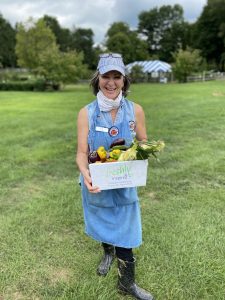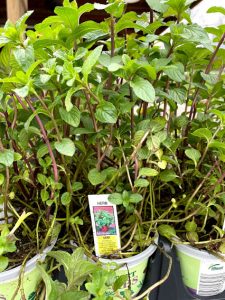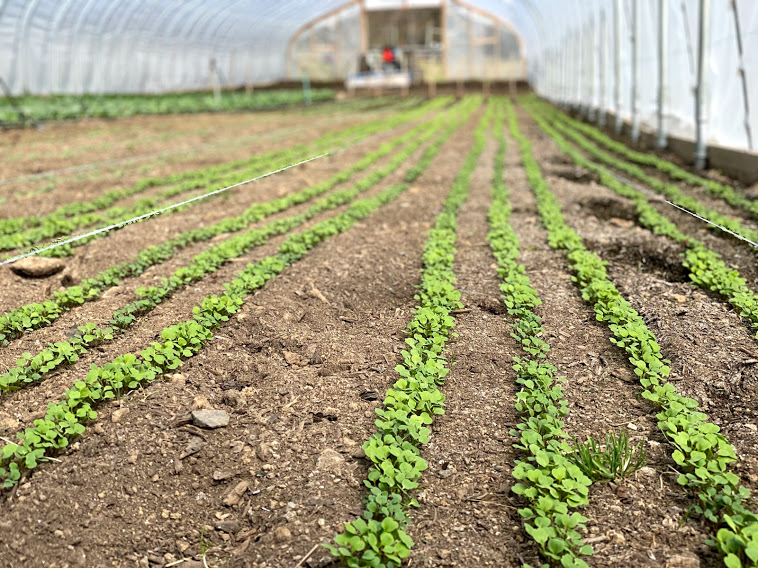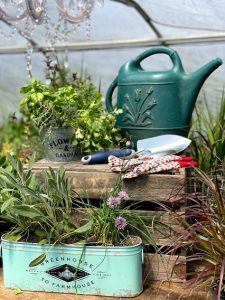Digging into Spring with Jenn Borrealo
Digging into Spring with Jenn Borrealo
Spring is a wonderful time of renewal and the perfect time for you to try something new like planting a garden or a window box garden. Enjoy these tips and tricks on how to grow the perfect herb garden at home provided by Jenn Borrealo, our Culinary & Educational Specialist. Start to plan your garden… Read More »

Start to plan your garden now in April. A size of 10 x 10 ft. or smaller is a good plan for beginners. Think about how you are going to protect the garden from all the animals that will want to nibble. Some gardeners say that planting garlic around the perimeter of the garden will help to keep pests
away. It may or may not work for you, however, you can try. Notice the tall fencing we have here at the farm. The fencing is in place to keep pests out as we have to be sure to reap a harvest to feed families. Figure out a solution that works for you and your situation.
There is some work to do with the soil before you start planting. The soil will need to be turned and if you work with the 10×10 dimensions plan to spread 5 lbs. of lime to work into the soil. Keeping in mind you must adjust the amount of lime to your garden size. If potatoes are in your plan, mark off an area and do not work that soil with the lime as potato crops prefer acidic soil. Your soil will then need to be raked smooth to be ready for planting.
Some of you may prefer to plant vegetables and herbs in pots rather than in the ground,
either way be sure to choose a sunny spot for your success.
Vegetables and Herbs that can be planted now in April such as these cold weather crops;
Peas, Lettuce, and most leafy greens. All cole crops from the Brassica Family of Vegetables that we know as broccoli, cauliflower, cabbage, kohlrabi are safe to plant now. They are all plants that do well in the cold, so they are often called cold crops.
It is safe to plant roots and bulbs and tubers as well, including onions, shallots, leeks, scallions, beets, carrots, and radishes, turnips, all root vegetables, and they are all ready to be planted.
And don’t forget tubers, the most popular being potatoes, can be planted now and do not need to be planted where you treated with lime.
Most herbs can be planted now, wait to plant basil when temps are above 50 degrees daily. If planting an indoor garden, go ahead and plant that basil indoors now .
I like to plant herbs just outside my kitchen door in my flower boxes and in large pots. They identify who I am, and they are right there when I am preparing, and I can step out for just a minute and snip. Before you begin to plant in your pots, Be sure the pots have drainage and be sure the soil is light and aerated. If they are not light and the soil is compacted go ahead and add a little vermiculite where needed and mix thoroughly.
Herbs will come to you from our farm in a 4-inch pot so if you plant 3 in a 12-inch pot you have not given them room to grow. My herb pots are usually 16-18” and I plant 3-4 herbs in each pot.
Herbs can be annual or perennial. Some being tender perennials and some are considered to be biennial. Perennial herbs are mint, chives, oregano, and sage and thyme, lavender
Tender perennial is rosemary. Annual herbs are basil, cilantro, dill, lemon balm, and dill.
A Biennial herb is parsley although I have had parsley live through some very cold weather and snow, I have never had it come back the following year. How about you?
In one pot you may grow Rosemary, oregano, sage, and thyme. I have placed chives in the center of this pot in the past to create a nice display. It is my largest pot so that the plants have room to grow and larger pots require lower maintenance. Plan to transfer these plants into a garden in September so that they have time to establish and then they will come back next year.
Plant lavender in your perennial garden. Plant basil in its own pot. Most of us want more than one plant, especially if pesto is in the plan so make appropriate accommodations.
Chives seem to do well anywhere, and they come back every year. They have returned to my flower
boxes and to a few of the pots from previous years.
I plant two kinds of parsley, flat leaf and curly and I plant them both in the same pot.
My plan this year is to plant cilantro and dill in their own pots and then purchase some seeds to add to the pot as that first plant will never make it through the season. (Not to worry, the farmers are here to help us, they always have cilantro and most of the time dill is available too!)

Herbs need just a light fertilizer every few weeks. Choose an organic granular or liquid fertilizer. Get everyone in the family involved in the garden. Make it fun. Find some cool pots or containers to plant in. Plant some veggies in pots or flower boxes. Plant a theme garden, like a pizza, you can start with the herbs now and add the tomatoes and peppers later.
Every year in March and April I plant peas in my flower boxes. They grow, bloom, and look pretty and they are a great snack or addition to my salad or meal plan. Peas are a fun vegetable for children to discover. First taste the flowers, they taste like peas and they can be added to salad as well. The first shoots from pea seeds are pea shoots and they can be used as a salad green. When allowed to mature, flower, and produce the pod peas are easy to pick. So, plant in some different containers so that you can have a little of each.
Make a trellis from all the fallen branches this winter or find one that appeals to you at a garden center or on-line, it will be great to grow peas, and then maybe beans.
If you find that you love gardening, you might think about some of the small greenhouses that are
available or even a tunnel to lengthen the season. Pallets make gardening fun too.
There are so many neat containers and vertical ideas. It is really endless.
If you don’t have a big yard or too much time pots on the deck will work.
If you live in an apartment grow on the balcony or roof or maybe even consider joining a community garden.
Whatever you do, remember to relax and enjoy the whole process from planting to sowing and growing to harvesting. It’s so much fun and “sow” rewarding! Our website is loaded with all sorts of delicious recipes for you to try and we always love hearing from you. Tag us in your garden progress on social media @alstedefarms or email us your photos for sharing info@alstedefarms.com
We have a large assortment of potted herbs, veggie & flower transplants as well as fruit brambles available in our farm store. We also carry high quality potted soil as well as bulk mulch and offer easy online ordering with curbside pick-up or local home delivery for your added convenience. Give us call so we can assist you 908-879-7189.
Best wishes from our farm kitchen to yours!








